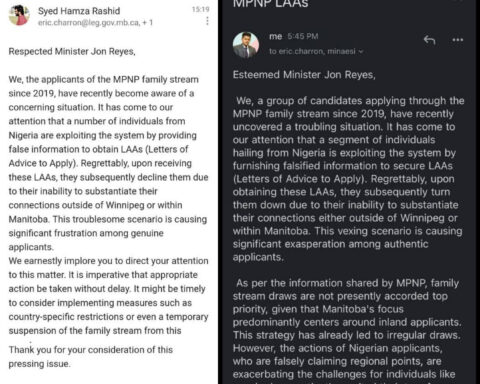Winnipeg is set to be home to a modern spin on a centuries-old financial tool aimed at helping people — particularly in Black immigrant communities — achieve their financial dreams.
The tool, an app called AjoPro, is a community funding platform designed to create a localized financial system for immigrant communities in Canada. The app is based on a rotating savings and credit association (ROSCA) system that has been used worldwide for generations, formally and informally, to support community members’ financial goals.
Developed by immigrants for the benefit of fellow immigrants, AjoPro aims to create an “ecosystem that connects immigrants with a savings and contribution-laddering system.”
An alternative financial service
The app works by pooling regular monetary contributions from AjoPro members into one funding pot over set intervals or cycles (monthly, bi-weekly, etc.). At the end of each cycle, one of the members collects the money in the fund, with a different member receiving a payout per cycle. App members are placed into groups with people who have similar purchase interests so they can all meet their financial goals with the support of each other.
ROSCA systems, which AjoPro is modelled after, have been present in Canada for decades and have been used as a financial tool to help newcomers in the country. A 2017 report published in the Canadian Journal of Nonprofit and Social Economy Research says ROSCAs are commonly used by Afro-Canadians and that this community-driven financial cooperative system has been “incubating within the Canadian diaspora for the past 70 years.” ROSCAs provide an alternative financial service to Canadians who feel excluded from financial institutions for various reasons including their race, income or immigration status.
The AjoPro app does not charge interest or perform credit checks and relies on members to make the payments they’ve committed to each cycle. While it may seem risky, the app operates similarly to community-driven financial systems around the world, turning to social connections and obligations to hold members accountable. The AjoPro website says the app assigns members a trust rating based on their payment history. This rating determines member pairings, as well as what position a member will take in their group’s cashout cue. If someone makes a late payment, their trust rating will be lowered and their cashout position will be automatically furthered, meaning they have to wait longer to collect their money.
Helping people reach their financial goals

AjoPro co-founder Akeem Adebisi says there is growing interest in the app — particularly among the Afro-Canadian community in Manitoba — based on data that has been collected so far. Adebisi is part of the Afro-Canadian community and says AjoPro helps “to build an economic base for [his] community.”
He says he believes Afro-Canadians do not have as much economic power compared to other racialized groups because money earned by Afro-Canadians is often spent and invested outside of the community. One of the aims for AjoPro is to keep money circulating within the Afro-Canadian community to ensure it supports people’s livelihoods and businesses.
In 2021, Mary Mekwunye and her husband, Jude, were looking to save money to buy a car for their young family in Winnipeg when they were introduced to the app. They were curious enough to give it a try and started storing their savings on the platform. They bought their family car in quick time and have now started working towards another savings goal on AjoPro.
“We are now looking into buying a house with our second savings on AjoPro, while at the same time paying-off my study loan which I took when I went back to school”, Mekwunye says.
Saving for a mortgage down payment is the main motivation behind people’s use of AjoPro, according to Adebisi. He says AjoPro helps people put down a sizable deposit for a mortgage in order to reduce the amounts of their monthly payments and length of their mortgages.
Breaking the ‘cycle of debt’
Bunmi Aregbesola, an advisor on marketing and business strategy for AjoPro’s parent company, Rakoomi Inc., says that nearly 15 per cent of Canadians are not receiving adequate banking support and are “often forced to approach payday lenders to source for credit and finance.”
“These payday lenders sometimes charge up to 30 per cent interest, which forces people into a devastating cycle of debt,” Aregbesola says. The app is intended to help break that cycle of debt by giving its users access to capital at no cost aside from a nominal one-time fee to use AjoPro.
A study from Statistics Canada says that the debt-to-income ratio for immigrants is “markedly higher” than it is for people born in Canada, and that mortgages are a key driver behind the higher debt-to-income ratio.
Aregbesola says that with over 8.3 million immigrants in Canada — 23 per cent of the country’s population — and another 1.5 million projected to enter the country in the next three years, AjoPro is focusing on a highly profitable market.
The AjoPro app is becoming increasingly popular, Adebisi says, and has now been downloaded over 1,000 times. He anticipates that AjoPro 2.0 — the newer, updated version of the app — will hit the markets in February in response to its growing subscriber base. The product will formally launch on May 6, 2023 in Winnipeg as the first step to making it a permanent feature of Canada’s financial landscape.
This story was written as part of a partnership with Winnipeg Free Press.
Emmanuel Nwaneri is a journalist with about 27 years of writing, travel and journalism experience in Nigeria, South Africa and Australia. He moved to Johannesburg in South Africa where he spent 10 years as a writer, journalism tutor and commentator. His time in South Africa afforded him the chance to observe the fast-changing dynamics of a country popularly-known as “a rainbow nation." He relocated to Winnipeg with his family in 2018 where he has since found interest in the Customer Service industry. He has published Once Upon A Woman and is working on a second work of fiction.





